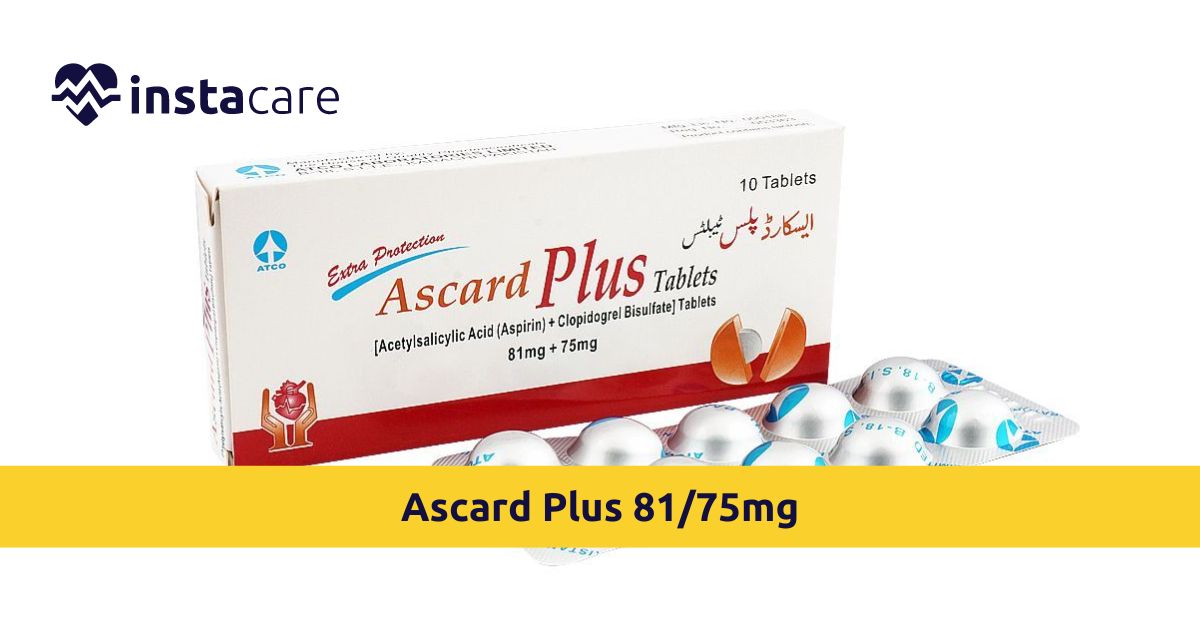Ascard Plus is one of those drugs which several individuals
are taking these days, but really, one needs to have an understanding of what
it is and how it functions. In this blog post, we'll review the key things you
need to know about Ascard Plus (81/75mg).
What is Ascard Plus?
Ascard Plus is a combination drug that contains mainly
aspirin and clopidogrel as its two active ingredients. While the former is
basically an anti-platelet medication for the prevention of blood clots, the
latter does the same by a different mechanism.
This dual drug combination Ascard Plus is used in the
treatment to decrease the risk of heart attack and stroke in patients who have
had a recent myocardial infarction or have stable angina, unstable angina,
atherosclerosis, acute coronary syndrome, or have a history of definite kinds
of cardiovascular illness.
What are the Doses of Ascard Plus?
Two strengths of Ascard Plus are available: 81/75mg, and 162/150mg. The strength of 81/75 mg contains 81 mg of aspirin and 75 mg of clopidogrel, while the 162/150mg contains 162 mg of aspirin and 150 mg of clopidogrel. The 81/75mg variety is the most commonly prescribed and used variety of Ascard Plus. This lower dose is normally deemed as effective as the higher 162/150mg dose but with fewer possible side effects.
How Does Ascard Plus Work?
Ascard Plus contains aspirin and clopidogrel antiplatelets, which help prevent potentially dangerous blood clots. Aspirin irreversibly inhibits the enzyme involved in the synthesis of prostaglandins and thromboxanes: cyclo-oxygenase. Prostaglandins are substances that play a lead role in platelet activation and aggregation, which could result in blood clotting. The other medication, clopidogrel, works by antagonizing the platelet P2Y12 receptor involved in platelet activation and aggregation.
Blockade by clopidogrel impairs platelet aggregation and hence clot formation. Combined use of aspirin and clopidogrel demonstrated synergistic actions on antiplatelet activity, leading to more effective prevention against clotting compared to either drug alone.
Who Should Take Ascard Plus?
- Ascard Plus is
usually indicated for patients who have had:
- Recent heart attack
- Acute coronary syndrome diagnosed, such as unstable angina
or some forms of heart attack
- Within the past year, a stroke or TIA has taken place
- Peripheral arterial disease diagnosed
Ascard Plus combines aspirin and clopidogrel to reduce the
risk of future heart attack, stroke, and, more generally, cardiovascular events
in the conditions described above. One
thing important is that not everyone can use Ascard Plus.
The following should not take Ascard Plus: Those with a
history of bleeding disorders Those with severe liver or kidney disease Those
with active ulcers How to Take Ascard Plus
Ascard Plus is taken orally with or without food; the dosage usually consists of one 81 mg / 75mg tablet daily. One should remember that one should not miss taking Ascard Plus once a day as prescribed by the doctor. Missing a dose or discontinuing this medication will increase your risk of having a heart attack or stroke to a very large extent. If you have missed a dose of Ascard Plus, then take it as soon as you remember. However, if it is the time to take the next dose, then skip the missed dose and continue with the regular dosing. Do not take a double dose.
Possible Side Effects of Ascard Plus
As with any other medicine, sometimes Ascard Plus can also cause side effects in some people. Common side effects are:
- Nausea and vomiting
- Stomach pain or discomfort
- Indigestion or
heartburn
- Diarrhea
- Bleeding or bruising more easily
- More serious side effects, although less common, may
include:
- Severe bleeding, such as stomach, intestinal, or brain
bleeding
- Allergic reactions
- Liver problems
- Low blood cell counts
It's important to report any side effects to your health care provider, particularly any signs of bleeding or unusual bruising.
- Interactions with Other Medications
- Ascard Plus can interact with other drugs you are using. The
major interactions include:
- Nonsteroidal anti-inflammatory drugs such as ibuprofen or
naproxen—increased risk of stomach bleeding
- Anticoagulants such as warfarin—increased risk of bleeding
- Certain antidepressants, SSRIs—increased risk of bleeding
Always inform your treating doctor about all of the drugs,
supplements, and vitamins that you are currently taking when you are starting
Ascard Plus.
Monitoring and Follow-up
If you are going to
be treated with Ascard Plus, your treating doctor will probably want to closely
monitor you, not only during the first several weeks or months of treatment but
also beyond that time. This may involve:
- Blood tests for
platelet count and liver function
- Monitoring for any signs of bleeding or bruising
- Adjusting the dose if necessary
It is very important to keep all follow-up appointments
scheduled for you and to notify your provider with any concerns immediately.
Conclusion:
Ascard Plus is a lifesaving drug for millions of people who
are at risk of experiencing or already suffering from heart attacks and
strokes. The proper understanding of its mechanism, who should take it, and
ways to take it properly ensure maximum benefit one shall get from this
combination therapy. As with any other drug, be sure to work closely with your
healthcare provider when using Ascard Plus or any other medication.
Please book an appointment with the best Cardiologist in Lahore, Karachi, Islamabad, and all major cities of Pakistan through InstaCare, or call our helpline at 03171777509 to find the verified doctor for your disease.

